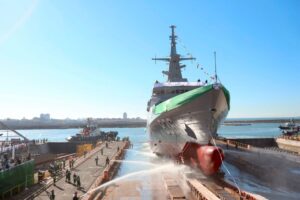Navantia handed over "HAIL", the third of five Avante 2200 corvettes ordered in 2018, to the Royal Saudi Naval Force (RSNF) on the second Sunday of Advent 2022. In addition to construction, the contract, which was valued at 1.8 billion euros at the time, includes logistical support and training - including the provision of training and instruction facilities for the ships' weapon deployment and platform control systems. Support during the entire life cycle and the provision of various services for the maintenance of the ships at the Jeddah naval base were also envisaged. The trade press described the deal as the largest order in the history of Spanish state-owned shipyards with a foreign customer.

The five units have now all been launched. The shipyard has agreed that delivery will take place three years after the start of construction in each case. "Al Jubail" was launched in July 2020, followed by "Al Diriyah" in November 2020, "Hail" in March 2021, "Jazan" in July 2021 and "Unayzah" in December 2021. Work on construction numbers four and five of this corvette class is to be completed in Saudi Arabia. The last ship is scheduled for delivery in February 2024.
MoU between Saudi Arabia and Navantia
Meanwhile, it has been announced that Navantia will supply further warships to the Arab country. Citing a report by the Saudi Arabian news agency SPA on 1 December 2022, the Arabic daily Asharq Al-Awsat reports on the conclusion of a memorandum of understanding to strengthen arms cooperation with Spain. According to the report, the Saudi Ministry of Defence, represented by the defence procurement authority SAMI, has signed a memorandum of understanding with Spain's Navantia for the construction of an unspecified number of multi-purpose combat ships. The formal understanding took place in the presence of the Saudi Minister of Defence, Prince Khalid bin Salman bin Abdulaziz, and the Spanish Minister of Industry, Trade and Tourism, María Reyes Maroto.

The deal is not only aimed at strengthening the Royal Saudi Navy. By committing the Spanish shipyard to building and integrating the weapons, sensor and ship operating systems locally, Riyadh sees itself one step closer to fulfilling its 'Vision 2030'. Among other things, this envisages the localisation of more than half of defence investments by 2030.
Maritime defence projects of others with Saudi Arabia
Unlike Germany, some partners in our Western community of values are somewhat more relaxed in their dealings with Saudi Arabia as a defence partner. Navantia and SAMI (Saudi Arabian Military Industries) founded the joint venture SANNI (SAMI-Navantia Naval Industries) in 2018 to better manage joint defence cooperation. In October 2019, SANNI signed a contract worth 985.5 million US dollars (approx. 880 million euros) to jointly realise the integration of the command and weapon deployment system into the future corvettes. In 2019, the French Naval Group entered into a similar joint venture with SAMI, under the aegis of which the construction and delivery of frigates, corvettes/OPVs and other armaments is to be handled. In December 2019, it was announced that Lockheed Martin had been awarded a contract worth USD 1.96 billion to build four multi-mission surface combatant (MMSC) ships for Saudi Arabia. They are derived from the Freedom-class Littoral Combat Ship (LCS) design.
While France delivered patrol boats (HSI 32) to Saudi Arabia (from August 2019), Germany banned the then Lürssen shipyard from exporting patrol boats to the country on the Arabian Peninsula. In October 2022, the Left Party parliamentary group tabled a motion in the Bundestag (20/3947) to stop exporting weapons to Saudi Arabia.
Is Germany being left behind as an armaments partner?
Riyadh is a favourite partner for Berlin's value-driven foreign policy. According to the Federal Foreign Office's website, Saudi Arabia is Germany's second most important trading partner in the Arab world (after the United Arab Emirates); Germany, for its part, is Saudi Arabia's fourth largest supplier. The most important German exports are machinery, vehicles, chemical, electrotechnical, precision mechanical and optical products. German values are therefore explicitly reflected in its arms export policy. Sooner or later, Berlin will have to ask itself how long partners such as Saudi Arabia will put up with this kind of treatment.
At another level, there is a risk that Germany will increasingly lose out in defence partnerships within NATO and the EU. This is because Germany's arms export control policy denies partners export opportunities for joint defence projects.
++++++++++










